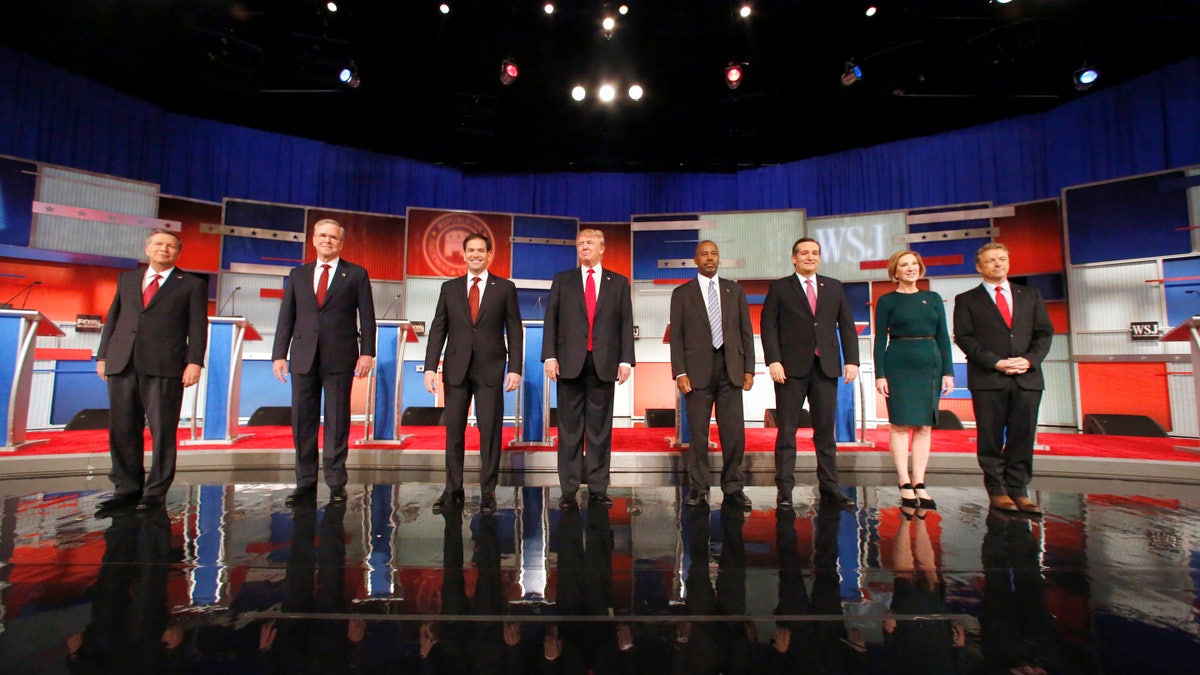
Nov. 10, 2015 - Republican presidential candidates John Kasich, Jeb Bush, Marco Rubio, Donald Trump, Ben Carson, Ted Cruz, Carly Fiorina and Rand Paul take the stage before the Republican presidential debate at the Milwaukee Theatre. (AP)
As Republicans jockey for their party’s top spot in the 2016 presidential election, more than two dozen GOP governors are meeting in Las Vegas to discuss how best to promote and capitalize on their executive winning streaks at the national level.
With a slight advantage over Republicans in electoral votes and growing support from Hispanic and Asian-American voters, conventional wisdom holds that Democrats are favored to win the White House in 2016. But President Obama will leave few coattails in 2016 – only 27 percent of registered voters would vote for him again, giving Republicans a meaningful shot at making gains at the state and national level.
The dissatisfied majority of American voters will be looking for real change in 2016. They want a leader they can support – someone who understands the economy and will support job creation, not create broad, business-choking rules often overturned by federal courts.
The eventual GOP presidential nominee has an opportunity to capitalize on this era of public discontent and lead our country forward, united behind a shared goal of economic prosperity and growth. And he or she should start by taking cues from the Republican chief executives leading some of the most prosperous states in the nation.
If Republicans present a vision of the American Dream boosted by free-market innovation, choice in jobs, choice in providers of services and a well-run government making tough decisions for a better future for our children, they will capture and inspire American voters.
Over the last four years, the GOP has excelled at the state level. In the last election cycle, Republicans picked up seven governorships, including swing states won by President Obama – Maine, Michigan, New Mexico and Wisconsin – and true blue states like Illinois, Maryland and Massachusetts. Since 2006, 44 of the 50 states have had a Republican governor. And the trend continues. On Nov. 3, voters in Kentucky elected their second Republican governor in four decades, Matt Bevin, in a big upset.
Voters increasingly look to governors to make tough choices against special-interest groups. That’s why presidential contenders should take a cue from them. If Republicans present a vision of the American Dream boosted by free-market innovation, choice in jobs, choice in providers of services and a well-run government making tough decisions for a better future for our children, they will capture and inspire American voters.
Between 2011 and 2014, GOP governors cut taxes by $36 billion, while Democratic governors raised them by $58 billion. And Republican governors are pushing back against unions by eliminating mandatory union membership, government union-dues collection, union-mandated labor for government projects and the protection of incompetent teachers. The 10 most business-friendly states in America are run by Republican governors.
Republican executive leadership is about more than just fiscal competence, however. It’s rooted in a philosophy that citizens are adults and can make decisions on what they want better than government can.
This GOP message of choice should resonate with voters across the political spectrum. Republicans support choice in doctors and health care savings accounts, choice in urban schools, choice for workers on whether to join unions, choice in construction workers for government projects, discretion in sentencing for nonviolent crimes and choice of taxicabs or Uber, hotels or Airbnb. This message works. In the November election, voters in San Francisco overwhelmingly rejected a measure that would have made it much harder for Airbnb to operate in the city.
Too often, the left speaks with a unified voice, but their loyalty to interest groups such as teachers, unions and trial lawyers means they often struggle to affect change through choice or challenge the status quo.
Democratic presidential hopefuls are selling smoke and mirrors, pushing for new and broader regulations and new taxes. They’ll promise a cornucopia of seemingly free gifts – college tuition, student-loan forgiveness, greater entitlements and more unemployment compensation.
Today, more Americans identify as independents than with either major party – a trend that is accelerating. A Gallup poll released in January found the number of self-identifying independents had grown to 43 percent of the electorate, up from 35 percent in 2008. That increase in the number of independents is concomitant with an overall decline among respondents self-identifying as Democrats or Republicans.
As the GOP finalizes its national party platforms, Republicans should focus on the benefits of the sharing economy, greater use of technology, data-based decision making, less litigation, clear and simple regulations, and empowering Americans and free markets. These are the critical issues driving our economy and sure to drive American voters to the polls next November.
